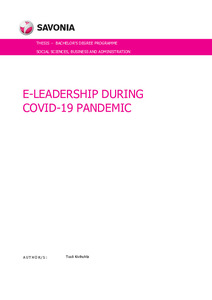E-leadership during COVID-19 pandemic
Kivihuhta, Tuuli (2021)
Kivihuhta, Tuuli
2021
All rights reserved. This publication is copyrighted. You may download, display and print it for Your own personal use. Commercial use is prohibited.
Julkaisun pysyvä osoite on
https://urn.fi/URN:NBN:fi:amk-2021121726723
https://urn.fi/URN:NBN:fi:amk-2021121726723
Tiivistelmä
In the spring of 2020 many Finnish organizations enabled remote work in order to prevent coronavirus from spreading. The change from working at the office required rapid and substantial changes in organization activities, such as leadership. Although the objectives of leadership do not change in virtual setting, some of its aspects demand special attention in order for the objectives of leadership to be fulfilled. The purpose of the study was to examine e-leadership from the leaders’ perspective during the COVID-19 pandemic. The research questions were as follows: what kind of e-leadership-related challenges the leaders had faced during the COVID-19 pandemic and what kind of e-leadership-related support their organizations had offered them during that time.
The theoretical framework of the thesis consists of three entities: leadership, e-leadership and trust. Leadership and e-leadership share the same functions but they take place in different contexts; functions of e-leadership take place in a context where work is mediated by information and communications technology. Trust, on the other hand, creates foundation for all human collaboration and its importance for both leadership and e-leadership has been recognized in the literature.
The research approach of the study was quantitative and the research material was collected by using an online survey. A link to the survey was shared in the researcher’s LinkedIn and it was sent via email to several student groups of Savonia University of Applied Sciences. The survey was targeted to leaders who had worked mainly remotely since the spring of 2020.
The results showed that leaders had faced challenges particularly in two different areas: sense of communality and interaction. There had been less interaction and also the quality of the interaction had deteriorated when compared to working at the office. Leaders had also found it difficult to support the sense of community via information and communications technology. The support the leaders had received from their organizations included social support from fellow leaders, training provided by employers and support from leaders’ own supervisors.
Based on the results it was recommended that leaders should support interaction and therefore the sense of community by arranging meetings on a regular basis. Leaders had found discussing with their fellow leaders helpful in the change from leadership to e-leadership, because discussions enabled them to share good practices, meet challenges as well as offer encouragement and advice. As leaders had found discussing with their fellow leaders helpful, it was also recommended that organizations could support leaders by arranging informal meetings for them where these topics could be discussed.
The theoretical framework of the thesis consists of three entities: leadership, e-leadership and trust. Leadership and e-leadership share the same functions but they take place in different contexts; functions of e-leadership take place in a context where work is mediated by information and communications technology. Trust, on the other hand, creates foundation for all human collaboration and its importance for both leadership and e-leadership has been recognized in the literature.
The research approach of the study was quantitative and the research material was collected by using an online survey. A link to the survey was shared in the researcher’s LinkedIn and it was sent via email to several student groups of Savonia University of Applied Sciences. The survey was targeted to leaders who had worked mainly remotely since the spring of 2020.
The results showed that leaders had faced challenges particularly in two different areas: sense of communality and interaction. There had been less interaction and also the quality of the interaction had deteriorated when compared to working at the office. Leaders had also found it difficult to support the sense of community via information and communications technology. The support the leaders had received from their organizations included social support from fellow leaders, training provided by employers and support from leaders’ own supervisors.
Based on the results it was recommended that leaders should support interaction and therefore the sense of community by arranging meetings on a regular basis. Leaders had found discussing with their fellow leaders helpful in the change from leadership to e-leadership, because discussions enabled them to share good practices, meet challenges as well as offer encouragement and advice. As leaders had found discussing with their fellow leaders helpful, it was also recommended that organizations could support leaders by arranging informal meetings for them where these topics could be discussed.
